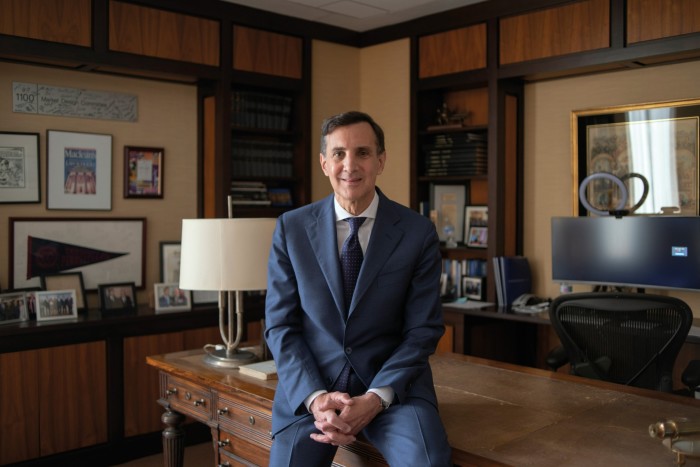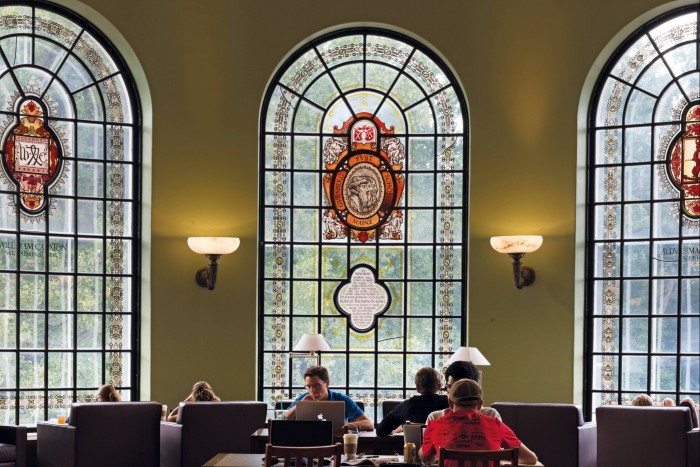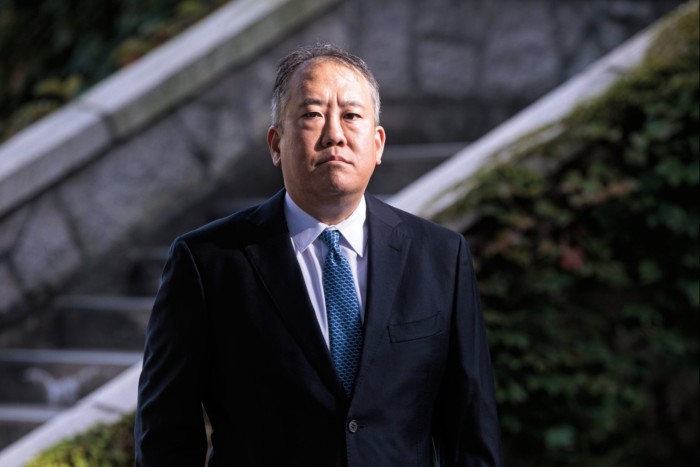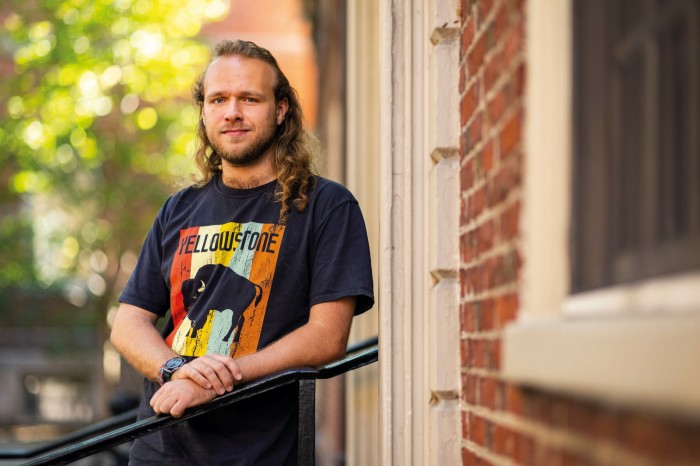Top US universities under pressure over legacy admissions

Simply sign up to the Education myFT Digest -- delivered directly to your inbox.
The president of Johns Hopkins University, Ron Daniels, has a warning for wealthy and well-connected American families. He predicts a widening cull of the legacy system, the controversial practice of top US schools preferentially awarding places to the children of alumni.
“Discussions are under way in a number of boardrooms of leading American universities,” says Daniels, who scrapped legacy places entirely at his own college in 2020. “It would not surprise me to see several more institutions deciding it’s time to end this anachronistic practice by the end of this academic year.”
His words will disturb those US households in which privileged young people seek to attend top universities where their parents or grandparents studied. And not just in America. Around the world, well-off alumni of leading US schools harbour similar ambitions for their offspring.
“From the first moment I was appointed, I came face to face with a widespread and remarkably unapologetic view on the use of legacy admissions,” says Daniels, who started attacking the policy soon after becoming president in 2009. “It was really pretty jarring when I saw the extent to which it wasn’t just a quiet practice but explicit.”
The 64-year-old Canadian-born lawyer argues: “It’s a paradox in this country that has a deeply professed commitment to equal opportunity and merit, and yet runs this programme conferring a significant advantage on students having some kind of connection.”

Legacy places are widespread, not only in the historic eight Ivy League colleges including Harvard, Yale and Princeton but in dozens of other private and some publicly funded universities, from Northwestern in Illinois to William & Mary in Virginia and Stanford in California. They are criticised by some as unfair and blocking social mobility, and defended by others as a way to nurture college communities and funding.
The debate has been rekindled by a landmark Supreme Court ruling in June: universities are suddenly coming under unprecedented pressure over admissions policies.
The judges struck down affirmative action, the practice of allocating places to students based in part on their race. The Department of Education then opened an investigation into legacies, and federal government guidance suggested scrapping the practice could be one way to maintain a diverse intake.
That has put the issue back on the agenda of colleges, applicants and their counsellors, alumni, and activists alike. A few prestigious establishments have buckled: in recent months, Carnegie Mellon, Amherst, Wesleyan and the University of Minnesota Twin Cities have all said they will no longer take legacies into account in admissions. Others including Rice, in Houston, are actively considering doing the same.
But the journalist Daniel Golden, who criticised the practice in his book The Price of Admission in 2006, sees continued resistance to reform. “If anything — until these past few months — legacy advantage became greater. It is unpopular with the general public and seen as un-American to admit someone based on who their parents are rather than on merit. But there was never any real political appetite to change it.”
Golden adds: “It’s a bipartisan game, with an establishment in the Senate who were themselves or whose kids are legacy. They don’t want to change the system,” he says. He cites examples from Donald Trump, whose daughter Ivanka followed him to Wharton, to Al Gore, the former Democrat vice-president, all of whose four children studied at Harvard as he did.
In the absence of hard data, anecdotal examples like these have dominated the debate on the influence of legacy. Universities have tightly guarded the information on precisely how the process works, and its prevalence. Harvard refused to discuss admissions for this article — even in general terms.
But fresh insights have come from the lawsuits that led to the Supreme Court judgment. Legal discovery revealed the extent of the practice: during 2014-19, one-third of legacy students who applied to Harvard were accepted — nearly six times the rate for non-legacy applicants. They comprised 14 per cent of the total intake; when combined with the related categories of athletes, and relatives of donors and faculty, they made up a third of the total class.
Peter Arcidiacono, a professor of economics at Duke University who analysed the data, says: “The preference is really big. It might be one thing if [legacy] was a tiebreaker, but it’s nowhere close. You’re giving advantages to people who are already advantaged.”
Less clear is the precise link between donations, legacies and admissions. But there is little doubt fundraising is pivotal to the elite universities, and they cultivate their alumni as key donors. A striking example is Daniels’ own institution, Johns Hopkins, where its billionaire former student, Michael Bloomberg gave $1.8bn to support access by students regardless of their backgrounds (his daughters did not attend his alma mater).

Last year, US universities together generated a staggering $60bn from donations, including nearly a quarter from alumni, according to a survey by the Council for Advancement and Support of Education. Nearly 90 per cent of gifts from former students were from those who had graduated more than 21 years ago.
The lawsuits also shone a spotlight on the ugly origin of legacies. They were introduced in the mid-1920s by Harvard’s then President Lawrence Lowell to tackle what he called “the Jew problem”. The white male Protestant elite that dominated the intake a century ago was under a perceived threat from a rising number of well-qualified Jewish applicants.
By introducing requirements for applicants to submit application letters, references, state their religion and be interviewed, Harvard added substantial discretion to its selection process. The proportion of Jews fell from more than 25 per cent to 15 per cent over the following decade.
Today, many legacy families stress shared values with their alma mater rather than seeking special advantage. Jamie Beaton, head of the college advisory service Crimson Education, says: “I see a lot of students who apply to the same universities as their parents. It increases their admission odds and reflects a sense of tradition, of generational ties to the institution.”
Sally (not her real name) agrees. Because her son is a legacy student now at Harvard, where both she and her husband studied and met, she does not want to be identified. “It was such a life-altering experience for me, the first time I was in an environment where people truly loved to learn. That’s what I wanted to pass on to my son,” she says.
“Merit should be the primary criterion but, in the case of two equally qualified applicants, there is nothing unethical in considering a legacy and having them receive the tip of the scales. The vast majority I’ve known have been exceptionally well qualified, have a unique understanding of what the fit with that particular school means, and how it creates a more engaged alumni base moving forward.”
David Yoon, the son of two Korean immigrants who had no legacy connection himself, shares that sense of loyalty. He studied at Harvard and Stanford, and met his wife through the Stanford alumni network: he is already beginning to think about college applications for his 10-year-old son.
“I owe Stanford everything,” he says. “University is a community of people . . . I think for alumni who are active and give back to the university, not just monetarily but in time and effort, there should be some recognition. Hopefully, when my son applies, that will reflect on his application. Not as a given, unearned advantage, but if he’s a very well prepared candidate, hopefully as a tiebreaker.”

Competition for places has only increased as universities, such as Ivy League Dartmouth, have offered “need-blind” admissions to global applicants regardless of their ability to pay. But, paradoxically, the relative advantage of the legacy place goes up, because the competition for these places does not necessarily increase as much as the surging demand for the non-legacy spots.
Chris Hathaway, head of Advantage Ivy Tutoring, says legacies remain important to help his clients gain admission to the universities they apply to. “If there’s a comparative advantage that is ethical and legal, we’ll use that.”
Longer term, universities worry that abolishing legacies will undermine fundraising. Jonathan Meer, an economics professor at Texas A&M University, who has studied the topic, says: “It’s hard to say with a straight face that donations wouldn’t help your child’s admission, although we can’t say by how much.”
And Allen Koh, head of Cardinal Education, a college advisory service, cautions that there has already been an adverse impact on funding as admissions officers seek to break the link between donations and applications. “Dozens of people are withholding eight-digit amounts. Their view is that, ‘If they don’t care about me, I might as well give it to another cause’.”
However, Matt McGann, dean of admission at Amherst, which has seen its share of legacy students halve to 6 per cent this year since scrapping any preference, says opinion among alumni was “mixed”, with a number “quite happy Amherst continued to take a leadership role”. He says donations remain in line with other universities retaining legacies.
To some, though, the strongest argument for not scrapping legacies is that it would not change anything or result in more diverse admissions. Many alumni children would get in anyway, given all the other advantages of their backgrounds.
“I’m not a fan of legacy, but I probably benefited from it,” says Elijah McGill, a Harvard student whose parents and one grandfather also studied there. “I had all these advantages already going into the process: two parents who really valued education and put a lot of time into my education as a kid. They knew how the admission process works. I got feedback on the application. So many alumni kids would be able to get in on their own merits.”

For example, Harvard economist David Deming notes that the university’s Opportunity Insights team recently showed that the richest legacy students (in the top 0.1 per cent of US household income) were seven times as likely as non-legacy applicants with the same SAT college entrance test scores to be admitted to the country’s 12 leading elite universities.
But he admits: “If the problem is a concentration of very high income students on campus, I don’t think getting rid of legacies would change it. Not all legacies are high income, and most high income students are not legacies. It’s become a kind of punching bag because it’s so clear, people find it offensive.”
He argues that better ways of boosting meritocracy would be increasing the overall size of the student intake, or setting a fixed exam standard and then picking randomly from among those who passed.
At a time of intensifying public suspicion of higher education in an increasingly populist and polarised society, the continued role of legacies is set to inflame further tension.
The US Department of Education’s probe, which focuses on Harvard, could lead to demands for the college to scrap legacy admissions or face litigation and the ultimate penalty of a withdrawal of all federal funding: That could set a precedent for institutions. Whatever the outcome, public opinion is turning firmly against the practice.
Daniels at Johns Hopkins argues: “The idea that you construct a community around intergenerational affiliation is flawed. We create a really robust sense of community based on the merits, strengths and aspirations of every class you admit. The continued use [of legacies] can’t help but bleed support for and confidence in the role of universities in supporting the core ideals of democracy.”
This article is part of FT Wealth, a section providing in-depth coverage of philanthropy, entrepreneurs, family offices, as well as alternative and impact investment
Comments